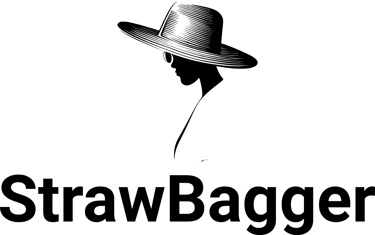Adopt a "strawbagger mindset!"

Bamboo Lyocell
Bamboo Lyocell: Its Benefits and Uses
Bamboo Lyocell is a sustainable fabric made using bamboo pulp through a closed-loop process that recycles water and solvents, similar to traditional Lyocell. Unlike bamboo rayon or viscose, which rely on harsh chemicals, Bamboo Lyocell is produced in a more eco-conscious and non-toxic way.
Benefits:
Eco-Friendly Manufacturing: Produced using a closed-loop system that recaptures nearly all solvents and water used.
Soft and Luxurious: It has a silky texture, making it comfortable against the skin.
Breathable and Moisture-Wicking: Ideal for regulating body temperature and keeping you dry.
Antibacterial and Hypoallergenic: Naturally resistant to odors and suitable for sensitive skin.
Biodegradable: Breaks down naturally at the end of its life cycle.
Uses:
Clothing such as loungewear, sleepwear, and casualwear.
Baby and children’s garments.
Bedding and bath textiles.
Undergarments and activewear.
Let's take a Closer Look at Bamboo Lyocell
Bamboo Lyocell as a Sustainable Fabric
1. What is Bamboo Lyocell Fabric?
Bamboo Lyocell is a semi-synthetic, plant-based fabric made from sustainably harvested bamboo pulp, processed using the closed-loop lyocell method.
Unlike traditional bamboo viscose—which can involve toxic chemicals—bamboo lyocell is created using a non-toxic solvent (NMMO) in a closed-loop system that recycles water and solvent.
It combines the sustainability of bamboo with the eco-friendly processing of lyocell, resulting in a soft, breathable, and biodegradable fabric.
The most recognized high-quality version is often marketed as TENCEL™ Bamboo Lyocell, although not all bamboo lyocell is certified by Lenzing AG.
2. Environmental Benefits
Closed-Loop Production:
Uses non-toxic solvents (NMMO) that are recovered and reused up to 99.5%, minimizing emissions and chemical runoff.
Produces no harmful by-products, in contrast to conventional bamboo viscose or rayon.
Fast-Growing Renewable Resource:
Bamboo is one of the fastest-growing plants on Earth—capable of growing up to 3 feet a day.
Grows naturally without the need for pesticides, fertilizers, or replanting after harvest due to its self-regenerating root system.
Water Efficiency:
Requires significantly less water than cotton and no artificial irrigation.
Biodegradable and Compostable:
Bamboo lyocell is fully biodegradable, decomposing in both home and industrial composting systems within a few months.
3. Durability and Longevity
Strong, Long-Lasting Fibers:
Comparable in durability to cotton and conventional lyocell, with excellent tensile strength, even when wet.
Fade-Resistant:
Holds dye well, resisting fading from washing and UV exposure.
Wrinkle- and Shrink-Resistant:
Naturally resists wrinkles, making it easier to care for with minimal ironing.
Long-Term Performance:
Maintains its shape, softness, and breathability over time, reducing the need for frequent replacement.
4. Low-Waste Production
Minimal Environmental Footprint:
Produces very little waste, thanks to the closed-loop solvent and water recovery system.
Non-Toxic Processing:
Avoids the harsh chemicals (like sulfuric acid or carbon disulfide) used in bamboo viscose production.
Reduced Resource Use:
Efficient use of raw bamboo material minimizes waste in both fiber extraction and spinning.
5. Versatility and Comfort
Silky Soft Texture:
Bamboo lyocell feels similar to silk or high-thread-count cotton—ideal for luxury clothing and bedding.
Highly Breathable and Moisture-Wicking:
Regulates temperature well, keeping the skin cool and dry, even in humid climates.
Hypoallergenic and Antibacterial:
Naturally resistant to dust mites and microbes, making it perfect for sensitive skin and allergy sufferers.
Wide Range of Applications:
Commonly used in sleepwear, sheets, dresses, underwear, activewear, scarves, and eco-luxury clothing lines.
6. Economic and Social Impact
Supports Ethical Manufacturing:
Bamboo lyocell production often adheres to environmental certifications (e.g., OEKO-TEX®, FSC®, or GOTS when applicable).
Encourages fair labor practices and transparency in supply chains.
Adds Value to Eco-Conscious Markets:
Gaining traction in industries focused on slow fashion, organic bedding, and zero-waste lifestyles.
Premium Product Pricing:
Slightly higher price point due to sustainable sourcing and eco-conscious processing, but increasingly accessible as demand grows.
7. Circular Fashion and Bamboo Lyocell
Closed-Loop Compatible:
Designed with circularity in mind, allowing for future upcycling or safe disposal through composting.
Encourages Extended Use:
Durability and performance promote long-term use, reducing consumption and fashion turnover.
Recyclable and Biodegradable:
Can be mechanically or chemically recycled in advanced textile recycling systems and also safely returned to the earth.
8. Things to Consider
Energy Usage in Processing:
While solvent recovery is efficient, initial processing requires energy—renewable energy sources can further improve sustainability.
Terminology Confusion:
Not all bamboo fabric is lyocell; bamboo viscose or rayon is often marketed as "eco-friendly" but processed with toxic chemicals.
Look for brands that clearly label "Bamboo Lyocell" and provide details about the manufacturing process or certifications.
Higher Cost vs. Fast Fashion:
Generally more expensive than bamboo viscose or polyester, but better aligned with long-term environmental goals and ethical values.
